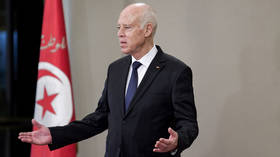African state rejects IMF ‘diktats’

The Tunisian president has rejected the terms of a stalled $1.9 billion bailout from the International Monetary Fund (IMF), citing unacceptable foreign influence and the risk of increasing poverty.
Speaking on Thursday, Kais Saied said he “will not hear diktats” and argued that cutting state subsidies will cause social unrest, while warning that “public peace is not a game.”
Tunisia reached a staff-level agreement with the IMF in October 2022 for a loan to support the economy over a 48-month period under an Extended Fund Facility. However the deal, which was supposed to be approved in December 2022, was postponed after the North African country failed to meet key commitments.
The loan conditions include cuts to food and energy subsidies, as well as a reduction in the public wage bill.
“It's true that some people who don’t need subsidies are benefitting from them, but we can find other ways to make sure they get to those who deserve them,” the president told reporters in Monastir.
Last month the World Bank suspended new lending to Tunisia after President Saied allegedly made inflammatory remarks about Sub-Saharan African migrants, prompting accusations of racism. A World Bank source told Africanews that the IMF will now face increased pressure not to approve the bailout.
Although members of the Tunisian government are pushing for an agreement with the IMF, President Saied insisted that “Tunisians must count on themselves” to find an alternative solution.
Tunisia has proposed a 26.4% cut in subsidy expenditure to $2.89 billion in its 2023 budget, but the government has yet to raise fuel prices this year, to avoid public outrage.












